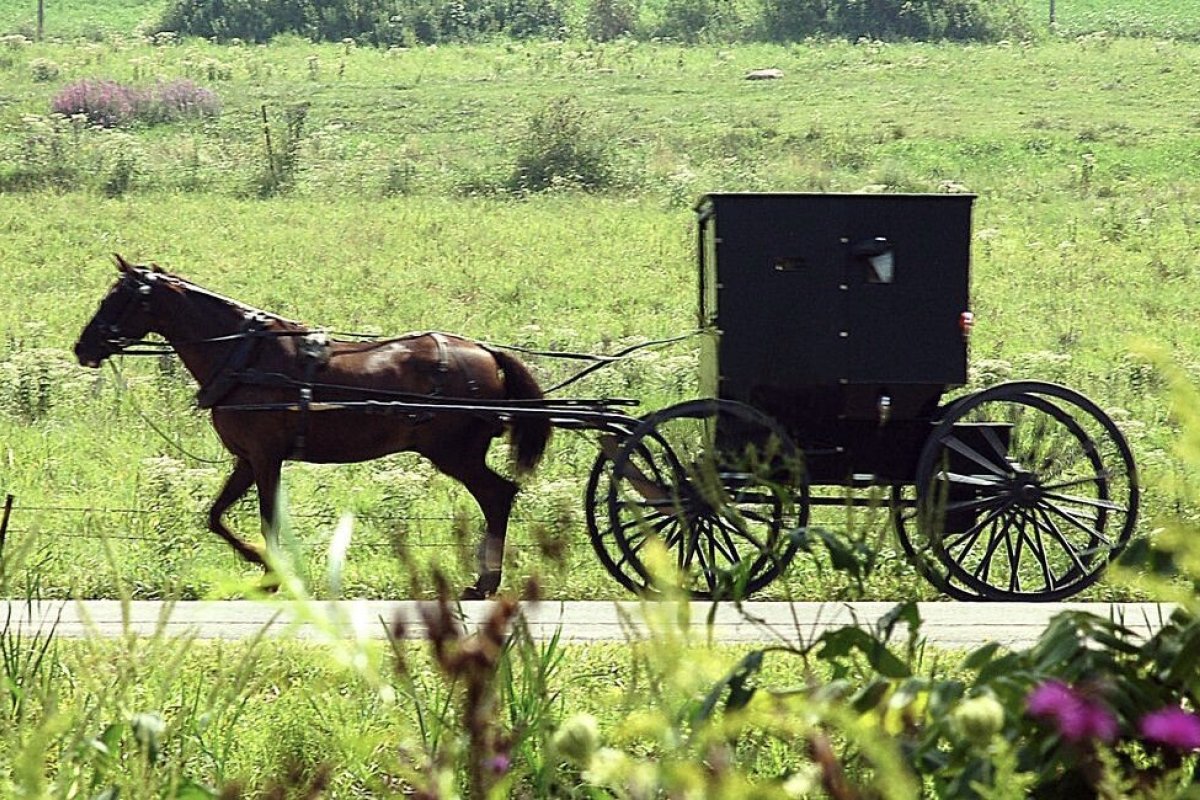
Shunning Religion
Prof. William Schweiker reflects on recent attempts to politicize the Amish and the implications for religion in the U.S.
The cultural landscape of the United States is filled with iconic images: some horrific (the Twin Towers on 9/11), some commercial (the Golden Arches of McDonalds), or athletic (Muhammad Ali standing over Sonny Liston), others celebratory (the Macy’s Thanksgiving Day parade), on and on through every nook and cranny of our society. Images sometimes meet and cross and mix: people watch football games on Thanksgiving or images of Ali decorate restaurants. One iconic image, this one religious, sparked this Sightings column; but one struggles to imagine it melding with other images of Americana. A horse trots down a country road weaving through farm fields freshly harvested and pulling a square black buggy. The image does not show, as so many like it do, the driver with his beard, overalls, white collarless shirt and black hat seated (maybe) next to his wife, likewise in black though with a lace hat. Children—also dressed simply—might ride along. Nonetheless, the viewer immediately recognizes this as an image of an Amish or Mennonite farmer somewhere near Lancaster, Pennsylvania or Mechanicsville, Maryland.
This particular image with driver hidden, no wife or children visible, appeared with a Washington Post article by Julie Zauzmer, “The famously secluded Amish are the target of a Republican campaign to drum up Pennsylvania votes for Trump” (October 9, 2019). The clash between the idyllic image and what it connotes in the American religious imagination with the title of the article made me confused and caused me to gasp. Think of the movie “Witness,” starring Harrison Ford, who has to enter one of these communities as an outsider and learns of their rejection of violence, being shown side-by-side with “Pulp Fiction,” which follows the crimes of two hitmen, Vincent Vega (played by John Travolta) and Jules Winnfield (played by Samuel L. Jackson). Peace, or, at least, the desire for peace, meets the glorification of violence! So, now it is time to reflect on this sighting of religion in our public life. Join me, won’t you?
First the details of the article and then we turn to consider some history and reflection. Turns out—what a surprise!—that Mennonites and the Amish do not usually vote because, as Zauzmer notes, they “believe fiercely in the separation of their religious community from government intrusion.” Nonetheless, these folks tend to agree with conservative Republicans about opposition to easily accessible abortion and same-sex marriage. Given this, an Amish PAC was formed in 2016 in the hopes of turning out the Amish and Mennonite vote, which could decisively change the vote count in the battleground state of Pennsylvania. The PAC has not done that well, mainly because people in these communities usually shun outsiders, those they call “English,” a point made graphically in the photographic image that showed no actual people. But the PAC struggles on, trying, by many means—billboards, MAGA hats, and the like—to get the Amish and Mennonites to turn out to vote for President Trump in 2020.
The pandering of political parties for religious votes is nothing new. It is part of the genetics of this nation’s politics. What is so odd, however, yet not necessarily unexpected, is the seeming lack of historical knowledge about religious communities on the part of political missionaries. Both the Amish and the Mennonites (those named after the important Reformation thinker Menno Simons) come from the so-called “Radical Reformation” of the sixteenth century. These communities, along with, ironically enough, forerunners to the “Baptists,” refused to pledge allegiance to their political rulers. Jesus never swore fidelity to Rome or took up arms to defend the “earthly kingdom.” Thou shalt not kill. Love your enemies and pray for those who hate you. The way of Jesus, Simons and others believed, is not a path that includes harming others, even if they harm you. They do not “strike back ten times harder,” as Trump likes to put it, when someone hurts them. “Turn the other cheek.” Revenge is not the way of Jesus.
How odd, then, that an administration bent on putting one’s nation first (MAGA) would try to get these people to vote for this president, or for any president for that matter. Political missionaries of any party should respect the consciences of the Amish and Mennonites who seek to protect themselves from the wiles of the world. One can only hope that the political missions fail and that the Amish and Mennonites keep their faith. This is not to say, of course, that these communities are free from problems: they have had theologians engaged in sexual abuse (John Howard Yoder), are riddled with drug and alcohol problems, and suffer young people leaving for other communities and ways of life. We should not and must not romanticize these or any other human communities.
Still, one of the bedrock principles of our experiment in democracy is the freedom and sanctity of conscience to resist coercion by the state. That being the case, we must hope that the folks in their buggies will continue to shun the “English” even while powerful forces are trying to shun their souls. What hangs in the balance is the validity of genuine conviction in an age of political manipulation.
Sightings is edited by Joel Brown, a PhD Candidate in Religions in the Americas at the Divinity School, with assistance from Nathan Hardy, a PhD Candidate in the History of Christianity at the Divinity School. Sign up here to receive Sightings via email. You can also follow us on Facebook and Twitter. The views and opinions expressed in this article are those of the author and do not necessarily reflect the position of the Marty Center or its editors.


